Note: I frequently update this post to make sure you’re kept up-to-date with the trends, skills and data.
It’s 2020 now and this year is special to me. I will celebrate my 14-year anniversary being a software tester.
Hurrah!!! (You don’t see, but I’m opening champagne :-))
Anyway, time flies…
14 years ago, I was a webmaster of a local shipping magazine while I was a last year student in software engineering. My job was to translate articles from English into Vietnamese, posted them to the website or customized the website when needed. While the job was great for a student, it’s not the type of work I would love to do (To be honest, I didn’t know what I really loved to do either). I was just thinking that I was young and that I need to do something new, something relating to software and something really challenging.
I then browsed job sites and found a company was hiring a software test engineer. “What the heck is software test engineer doing” I wondered. The job description listed some requirements, but I had no ideas what they were. … but I liked it. So I decided to write a CV and applied for the job.
Luckily, I was called for the interview.
“How was the interview?” you may ask.
Well, the interview went so bad that I wished I hadn’t applied for the position. I failed to answer most of the questions on software testing. However, there’s one thing I think I did well in the interview was I showed that I was willing to learn new things….and I passed the interview and have become a software test engineer.
Fast forward to today, I’ve been in software testing long time enough to realize that how lucky I was to be accepted for the job.
Now if you want to get into software testing, you can’t just solely rely on luck. Well, luck is part of life, but now you need to prepare and do a better job than I did when I first started because things have changed. Technology has changed, software testing market has changed, competitiveness has changed.
For that reason, I decided to write a guide to help you become a software tester. If you are planning to head into software testing career this year, this post is for you. In this post, I will walk you through things you should do, learn and prepare to come closer to the goal of becoming a tester.
Here is a table of content of the post:
+Why do you want to start your software testing career?
+What are required skills to become a software tester?
+Do you need programming to start your career as software tester?
+Communication skill is a must
+What about the career path? Does it have competitive salary?
+Does software testing require technical skills?
Phase #2: How to get into software testing?
+How to learn software testing?
+How to earn hands-on experience?
Phase #3: How to find a full-time job as a software tester?
+How to have a successful interview?
You can also download .PDF version of this post so that you can read it later.
Here we go.
Phase 1: Awareness:

This is one of the most important phases, but most of people skip it. People jump quickly right into the “How” without clearly understand the “Why” and the “What”. Understanding the “Why” and “What” will help you realize that if software testing is for you or not and if it’s something you want to do and get along. This awareness will also save you from spending time on doing the wrong thing.
I will show you the “How” down the road, but for now, bear with me with this part.
Basically, you have to answer following questions before going further:
1) Why do you want to become a software tester?
Now you want to be a software tester. Great!…but why?
Why would you like to choose software testing as your career?
Why software testing, but not programming, graphic design, IT, or database administrator, etc..
Keep asking more “Why” until you find what really motivates you to move into software testing

It’s okay if you don’t know the reason why you want to become a tester… and I understand. This is especially true if you are totally new and you have no idea what software testing is, how it looks like, it has a good career path or not, etc.
In order to help you have a better understanding and see if software testing is for you or not, let me do a real quick introduction about software testing and answer some of common software testing questions:
2)What is software testing?
Here is a definition from Wikipedia:
Software testing is an investigation conducted to provide stakeholders with information about the quality of the product or service under test. [1] Software testing can also provide an objective, independent view of the software to allow the business to appreciate and understand the risks of software implementation. Test techniques include the process of executing a program or application with the intent of finding software bugs (errors or other defects).
Here is a definition from ISTQB Exam Certification:
Software testing is a process of executing a program or application with the intent of finding the software bugs.
It can also be stated as the process of validating and verifying that a software program or application or product:
Meets the business and technical requirements that guided its design and development
Works as expected
Can be implemented with the same characteristic.
… another one from James Bach:
Testing is the process of evaluating a product by learning about it through exploration and experimentation, which includes to some degree: questioning, study, modeling, observation, inference, etc.
Here are some simplified and fun definitions:
Someone cooks something, and I’m the one who tastes to see if this’s delicious or not 🙂
“I get paid to tell people they have made an error”
I’m like a proofreader for a book – I go over everything with a fine tooth comb and make sure that it works the way it should.
I’m like a house inspector, but for software.
I hope you get an idea of what software testing is, but if you don’t, it’s okay. You will learn more about it later. For now, let’s just agree that software testing is to verify that software works as intended and is in good shape before releasing to customers or find defects in the application.
3)What are software tester requirements?
Even though software testing is not an inborn skill, software testing is not for everyone. In other words, it requires some specific skill sets which you hardly do the testing effectively without it. According to State of Testing Report 2019, they are:
- More emphasis on test automation / coding abilities
- Self learner
- Programming skills and Product/Business thinking
- Team player (works well with developers)
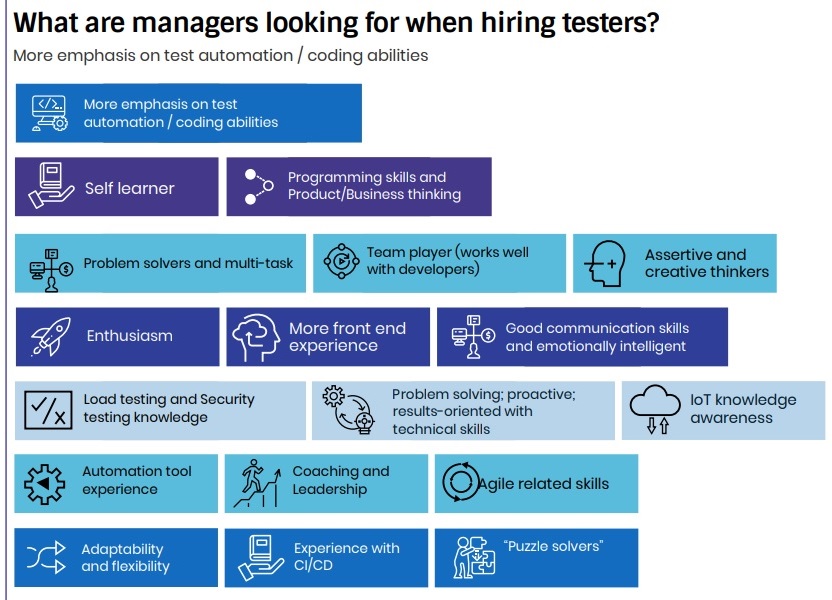
4)Do you need programming to start your career as software tester?
No, you don’t have to be an expert in programming or computer gurus to start in software testing.
I’m myself not a technical guy. Well, I learned software engineering, I can write code but I’m far from expert and to be honest, I haven’t touched any lines of code for 5 or 6 years. However, knowing how to program can help you understand how software is built (and how and where the code can be broken). Of course, you can still break the software without knowing how software is built, but if you know how the software is built from the coding’s perspective, you will find these bugs much more easily and systematically.
Also, knowing programming skill can really help you if you want to become an automation test engineer where you write scripts to execute the test cases automatically or build small tools to support you to test the software better.
Simply put, knowing how to code is nice-to-have, not a must.
5) Communication skill is a must
You may be not good at programming or technical skill, but you need to be really good at communication skills if you want to become a software tester.
Actually, communication skills are important not just in software testing but also in other fields. However, it becomes especially important in software testing because one of the goals of testing is to explore the system, find problems in the system and communicate these problems to managers/stakeholders. It doesn’t make any sense if you find a problem and you keep it yourself or nobody understands what your problem is about.
Actually, there are many skills under the roof of communication skills, however, I would like you to focus on these two skills:
+Bug reporting: Simply put. When you find a problem in the system, you need to report the problem to people in charge accordingly. Your bug report is very important because it not only tells the managers what are the risks in the system with the problem you’ve found so that they can make decisions, but also tells developers what exact problem is about, step-by-step how they can reproduce the problem, in what condition the problem occurs so that they can fix the problem.
Related read: Why Your Bug Report Sucks (and How To Fix It)
+Asking questions: Actually, software testing is all about asking the right question to expose the problem of the system under test. This is especially true when you test and explore the software as an end user or in case when you have no documents about the system. In such cases, your product becomes a blackbox.
What you would do is to use the product and then ask: what if I click this button? What if I edit the information and then I close the application without saving data? What if I do this…and then do that? What is this feature used for? Why we need it? etc..
Related read: 6 Tips for Software Testers on Asking Questions
6) What about the career path? Does it have competitive salary?
According State of Testing Report in 2019, below is state of testing salaries around the world. Of course, this is for your reference only. There are many other factors may affect a tester’s salary
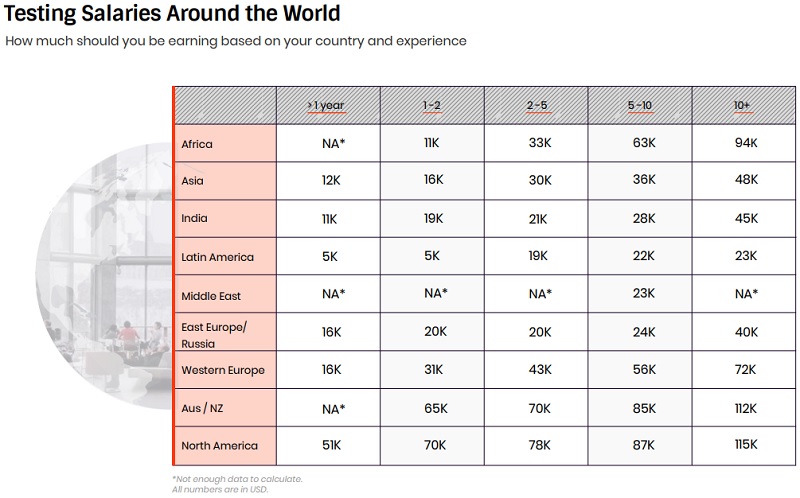
Source: State of Testing Report 2019
It means that software testing is still in need and most organizations still have budgets for it. So, don’t worry for now, there’s enough room for you to grow as far as you want to be.
More read: QA tester career paths, which one to choose?
7) Does software testing require technical skills?
If you’ve ever heard someone say that software testing is very easy and you don’t need any technical skill to do it.
I would say that they are dead wrong.
Like it or not, you still need decent level of technical skill so that you can effectively test the software. However, you don’t need to be an expert in programming, networking, database to do software testing. All you need is basic level of those skills when starting out.
Now, here is what I want you to do:
Stop reading for a few seconds and answer yourself the question:
What’s your gut feeling about software testing so far?
Is software testing really for you?
Is this something you want to do?
Is this something that interests you?
If your answer is a big YES, keep reading because I will go into more details and guide you how to become a software tester.
(If you don’t find software testing interesting so far, stop reading more. You now can open YouTube and find some funny videos to watch :-))
Download .PDF version of this post so that you can read it later.
Phase 2: How to get into software testing
Basically, you need to do these 3 things:
First: Learn about it
Second: Earn hands-on experience
Third: Go and find a full-time job
“Hey, but there’s nothing special in those steps? ” You may ask.
I agree…but here’s the thing:
You have to do these basic steps…the right way.
I’ll go into the point right now.
1) How to learn software testing?
You can learn software testing by different ways and each way has its own advantage and disadvantage. What you should do is to choose the one that is suitable for you and fits your context.
Below are some options you can choose from:
+Certification in software testing:
I’m quite sure this is one of the first things you think of when you want to learn software testing and start your career as software tester.
Even though there are a few negative feedback about software testing certification, I find software testing certification is a good way to start.
Why? Because it has a lot of advantages:
-You will get basic software testing knowledge
-You (may) earn experience
-You get credit. E.g.: You will become a “certified tester” when you get the certification.
However, there are a few issues with certification and you need to consider:
First, it will cost you money: This is obvious. I haven’t found any certification in software testing for free.
Second, certification may be misleading you (and turns out more harm than good). This is a more important point than the cost itself. Certification may mislead you and makes you think that you are now “certified” and what you learned is standard. As a result, you may limit yourself to the standard you learn and stop learning more things or accept new ways of doing software testing.
The whole point about certification I want to make here is that:
If you find certification helpful, go and get it…but don’t just stop there.
Here are a few certifications you can get:
International Software Testing Qualifications Board (ISTQB):
ISTQB® has created the world’s most successful scheme for certifying software testers.
As of March 2015, ISTQB® has issued almost 400,000 certifications in over 100 countries world-wide, with a growth rate of more than 13,000 certifications per quarter. – As per ISTQB
ASTQB – a US version of ISTQB (for those who are in the US)
If you don’t want to go with ISTQB, you can try these options which are recommended by many software testing experts in the world:
Blackbox Software Testing (BBST) by Cem Kaner
Rapid Software Testing (RST) by James Bach
+Self-learning:
If you don’t want to get certification for some reasons and all you have is time and ready to go by yourself, self-learning is not a bad option at all.
62% testers choose self-learning path:
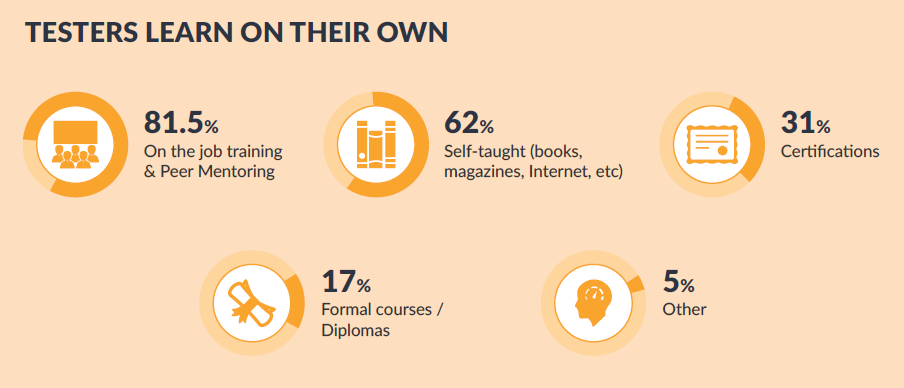
One of the great things about self-learning is that you will have a chance to explore and learn software testing from different sources. As a result, you have a wider view of software testing. The disadvantage is that it will take you time to learn things out and if you are new you may be distracted and get lost direction. But, if you can manage your time and schedule your learning properly, this is not a problem at all.
If you would like to go on “self-learning” path, check out best online resources to learn software testing. These are resources I myself used to learn software testing and I find they are helpful.
2) Earn hands-on experience:
What’s the number#1 complaint from Freshers when they search for jobs?
Well, most of the job ads require 2-3 years of experience in software testing even in a junior position
“I’m a beginner…how can I have years of experience” you are frustrated, you are nervous and this type of job ads turns you off completely.
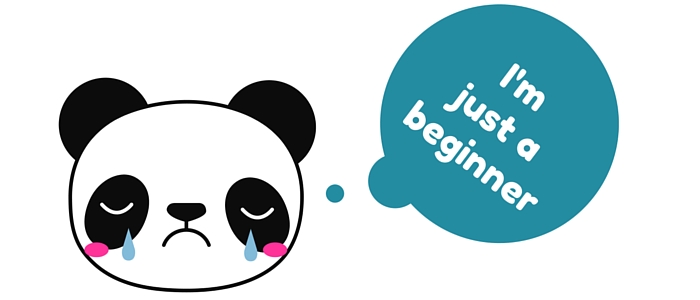
This is a “famous” vicious circle we all know about.
Set aside the job ads ridiculously requires years of experience for a junior position (believe me or not, many employers do not know what they really want in the job ad), you have to agree with me that in any professional jobs, hands-on experience will play the most important role to make or break the game. However, I find most of beginners make this mistake:
They think they can only get software testing experience only when they have a full-time job…and they set themselves in their traps and that vicious circle.
Don’t make that mistake! Here are a few ideas you can try to earn experience even before you have a full-time job:
+Looking for the opportunity as a freelance software tester
While applying to find a freelancing job is still challenging, but it’s much easier in comparison to full-time tester. There are a few trusted sources where you can find freelancing jobs as software tester:
>uTest: uTest is considered one of the most crowded communities of software testers in the world. With 200,000 professional testers and many freelancing job opportunities offered, you will surely learn a lot of things and earn experience from there.
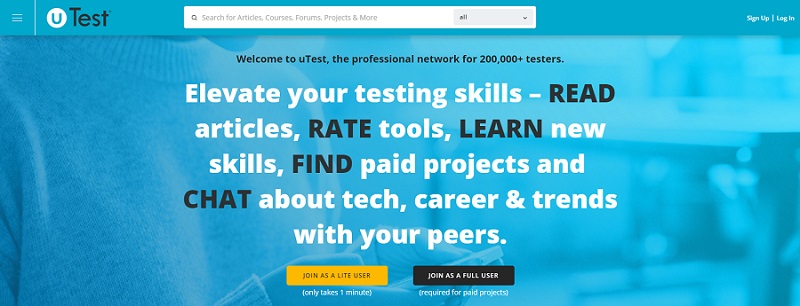
Related read: How to earn extra money as freelance tester on uTest
+Practice to test your everyday applications
All applications have bugs. You can spend your time on exercising the application you use every day such as Facebook, Twitter, LinkedIn, Google Chrome browser, FireFox and see if you can find bugs.
Next step is to report this bug to customer supports. Once they confirm it’s a bug and they will fix, you are going good. Note this bug down and add this achievement in your CV.
If you can find bugs in these applications, congratulations! You have proved that you know how to find bugs too.
(I’ve recently found a bug on LinkedIn. If I can do that, you can do that too :-))
+Join workshop or local Meetups
Search for your local workshops or Meetups and join them. This is perfect opportunity for you to meet with other testers and practice your software testing skills.
There are some good workshops run by well-known testers in the software testing community you can choose to join:
>TestBash – Conference, workshop event from MinistryOfTesting
Even though I haven’t got a chance to join these workshops, these workshops are well-known and received good reviews and feedback from the software testing community.
+Ask for one-on-one coaching:
If you have friends or someone you know has many years of experience in software testing, you can ask them for a one-on-one coaching. You will be surprised that there are many great testers out there willing to help and share their testing experience. It would be great if you have a skill that they want, you can exchange with them. If not, you can buy them coffee, lunch or pay to ask for help.
[Note: Of course, if you need any help from me, you can shoot me an email at thanh[at]asktester.com]Those are a few ideas you can try, but don’t just stop there. Be creative and proactive to earn experience in software testing.
Don’t go to the interview with your empty-hand.
Download .PDF version of this post so that you can read it later.
You have already built your groundwork so far and you should be ready to go to the next important step:
Phase 3: Find a full-time job as software tester
Now, one of the common mistakes most of people (testers) make is to do the following to find a full-time job:
Here is what most people (testers) do to find a full-time job:
1) Browse job sites
2) Pick up several jobs that sounds fit
3) Write one CV and send it to all the job ads
4) Hit Send
5) Pray
It’s no wonder why they hardly receive calls for interviews.
Here is what you can do instead:
1) Warm-up and networking
+Join LinkedIn and …be active on that.
 LinkedIn is considered the number #1 network of professionals in the world. It means that your employers may be already there. It means that hiring team may be already there. It means that most of professional testers already there. This is great place for you to let those people know more about you, your software testing skills and your professional.
LinkedIn is considered the number #1 network of professionals in the world. It means that your employers may be already there. It means that hiring team may be already there. It means that most of professional testers already there. This is great place for you to let those people know more about you, your software testing skills and your professional.
Joining LinkedIn is easy:
>Create account
>Update your profile by adding your skills, achievement, education, certification, things you care about, etc. (Don’t just create profile for its sake, take it seriously because you need to be professional here)
>Find and add connection. Don’t just add any connection, choose to invite and add those who are testers or who are working in the company you want to apply for.
>Join groups and start discussion: if you are testers, you should know the following LinkedIn group (Software Testing and Quality Assurance group). Join these groups and start asking questions, answers questions. This is important because this shows you really care about software testing and you are taking your career seriously.
Hey, I’m in LinkedIn too, let’s connect!
+Attend local conferences:
Search any software testing related local conferences and attend them.
Conference is a great place to attend and learn software testing knowledge. However, the most useful part of the conference is networking. You will have a chance to network with other testers, employers. In some conferences, they have booths to interview and hire fresher too.
So, do not miss this great opportunity.
2) Write a CV that works
There are a lot of tips you can find on how to write a good CV. You may not need more guidance on this. However, regardless of the guide, template you use, make sure you do this in your CV:
+No spelling and grammar error.
People make this mistake all the time. I basically reject candidates make spelling mistakes in their CVs.
Why?
This shows that the candidate is too lazy and careless. As of 2016, we all know that how easy it is to do a spell check on MS Word program. So, having a spell check on a CV is not an excuse anymore.

+Design and Formatting
It’s okay if you get creative and decorate your CV a little bit, but don’t make it like you are applying for a graphic designer position.
Keep your CV clean and consistent with good font size, font face.
+Short and scannable
It depends on the position and job markets you are applying for, more often hiring team receive many CVs from applicants. The goal here is to make your CV short and scannable.
>Short:
Don’t make your CV become an essay. Keep it short at 1-2 page.
“Why? I have a lot of things to tell the employer and I don’t want to leave them out” you may ask.
Sure, you have a lot of things to say…but the hiring team also has a lot of work to do too. They don’t have enough time to read your CV word by word to dig gold.
So, keep your CV short
>Scannable:
By scannable I mean that you have to make your CV in a way that readers can easily find what they want.
The key thing is you have to figure out what the hiring want, what they are really looking for in the CV.
How?
First, you need to read the job description carefully and understand what skills, requirements they are looking for
Second, customize your CV so that your CV looks matched with what they are looking for. It’s recommended to use the same terms and language as in the job description.
Ex: if the job description says they are looking for someone can “write test cases”, make sure you use “test cases” phrase to describe your experience even though you are familiar with phrase “test procedures”. If the job description says they are looking for someone can “File defects”, use “file defects” phrase in the CV even though you are familiar with phrase “report bugs”.
So, you got the idea right.
The goal here is not to show off your linguistic knowledge, the goal here is to make sure you and hiring team are talking the same language.
Download my CV template. Nothing fancy, but you can refer it if you like
After you follow my guide so far, I hope that you will receive a few phone calls for interviews.
Congratulations!…but you’re not done yet.
You are 50% complete to become a software tester. The other 50% is to pass the interview round 🙂
3)How to have a successful interview?
I can’t count how many guides, advises written about this topic, but people still fail at this step.
The reason is because having a successful interview is crucial and…because it’s easy said than done.
It depends on different factors to have a successful interview, from my interviewing experience, it boils down to these key points:
+Create a positive first impression.
This is extremely important because
“There’s no second chance for the first impression”
There’s no one-size-fit-all advice here. All I suggest is to dress nice and professional. Calm and clear in response.

+Research
Research about the company you’re applying for to see what business they are in, their products, their team, their environments…the more details you know about the company the better you are. You will surely impress the interviewer how well you know about their organization. This shows that you are serious when you apply for the position
+Be honest in the interview
When answering interview questions, be confident and try your best to answer those questions but you have to be honest. Don’t brag or fake it until make it.
+Show the ability to learn
Prove that you are willing to learn new thing even though you don’t have experience before. Actually, nobody knows everything. The distinction is the ability to learn new thing.
+Be confident
I know it’s hard to be confident when you’re new and don’t have much experience, but being confident is important. Don’t hesitate to ask questions during the interview to clarify the question, to know more about the company. This not only helps you answer the questions better, but also help you see if the company fits you or not.
Remember, you are looking for a job not begging for a job.
What if I failed…
What if you follow all these things and things still do not work out themselves and you do not become a software tester?
If that’s the case, you’re not alone. It’s not that you’re doing something wrong or software testing is not for you.
Sometimes, you still need luck to achieve the goal, but you know what? Luck will find you if you keep working hard and consistently.
Final thought
There you have it, a complete guide to how to start a career in software testing. I’ve tried my best to provide you all possible ideas and guides to help you step by step closer to the goal of becoming a software tester. This guide is far from the perfect guide, actually there’s no such thing. All you have to do is to understand yourself, try these guides and see what works what not. It’s you, not me, not your friends will make you become a software tester. The journey to become a tester is tough, but I can do, so you definitely could do that too.
What’s next?
Check out my email course for beginners: Design Effective Test Case in 5 Days (It’s FREE)

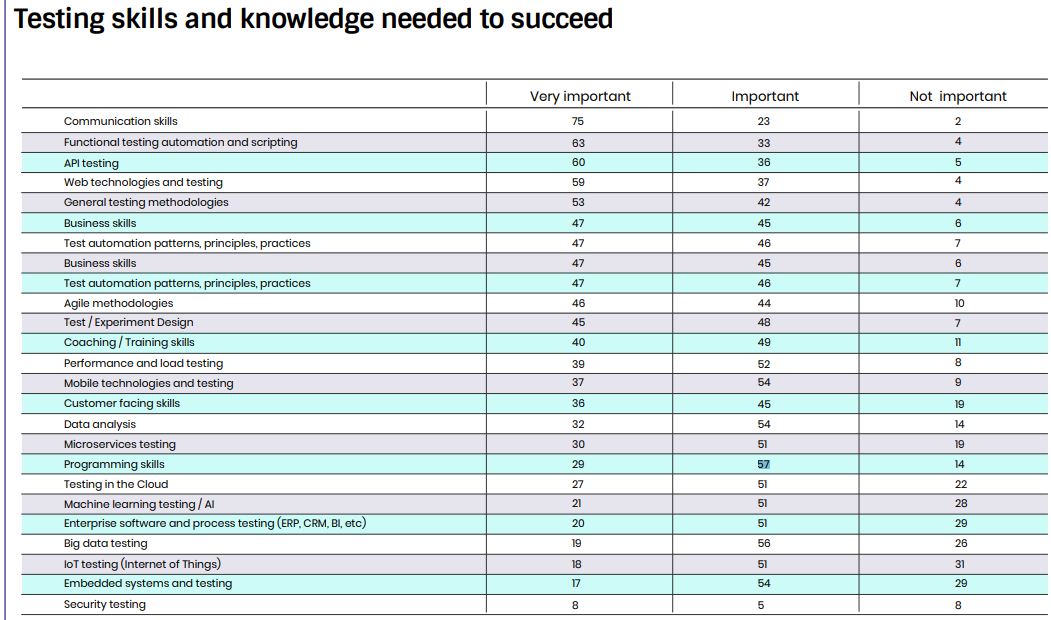
This is very nice article thank you for share this wonderful information many software peoples does not going on software testing team this is very difficult task for every peoples. This must be taken by the all details of testing processes. this is common for all processing techniques. this is common for all details about from this program development processes.
Hey Thanh,
This is an excellent post! The post covers many valid steps to help new testers start their career in software testing. Even though I’m not new in software testing, I still see the guide useful.
Well done!
-Daniel
Great article! I have been doing QA testing (99% manual) for 2.5 years. I saw things in this I had not known before, kudos!
Also, do you have any good resources on where to look for QA conferences or seminars?
Thanks,
Nichole
Hi Daniel,
Thanks for your good words.
Hi Nichole,
Glad you like that post and see it useful.
Regarding your question about QA conference, I assume you mean software testing conference. There are quite a few conferences in software testing such as EuroStar conference (if you are in Europe), STAREAST and STARWEST (if you are in US). Those are biggest software testing conferences I know.
There are a few other conferences, you can check out the list here: https://www.qasymphony.com/blog/top-software-testing-conferences-2016/
Best luck to you!
-Thanh
Wow, this is beautiful Thanh, congratulations!
Thank you! This is very helpful and inspiration. I am in a stage of looking for job as a software tester. Wish me luck:-)
@Ja,
Thank you.
Good to hear that and of course, I wish you luck!
Feel free to share how’s your journey going.
Thank you so much for this article Thanh! It’s really inspiring! You make us believe that anything is achievable 🙂 It is very nice to see some people trying to help others out by guiding them in the right direction.
Thank you for this information. It’s always good to hear from people already in the industry. So far I’ve found it extremely difficult to get into software testing, even with IT experience (including manual testing projects within past roles) and the ISTQB qualification. I’ve been applying to entry level testing jobs since my late 20s (now 30) and haven’t managed to get an interview. I’m stuck in generalist IT/tech support contracts that occasionally give me testing or coding tasks, but never lead into full-time QA/testing roles. It’s very difficult not to get discouraged. I live near London too, which should make things easier when it comes to jobs. I’ve had testers look at my CV (there are two in my family) and I go to local QA/meetups to find new contacts and network, but nothing ever comes of it. Everyone seems to want only testers with several years of experience. Reading blogs like yours keeps me going whenever I feel like giving up.
Hey Sudoku,
Thanks for sharing your story and good words about my post.
I don’t think your case is uncommon and it’s your fault either. It looks like that’s how the job market these days is going. Employer is looking for candidates with years of experience under their belts and new testers cannot find jobs because …they don’t have experience…and that’s the vicious circle.
Every job market has its own competitiveness. You say you live near London and you think it’s advantage. I don’t live there but from my guess the competition is likely high for a job position there. Anyway, if the competition is high, you need to be “stand out” or unique to be noticed and called for an interview. If you haven’t updatd your CV for years, it’s likely that your CV is out-dated. Check out the job description and see what skills, certifications they are looking for and update your CV accordingly (of course, you don’t want to fake it :D).
If you really want to become a tester, don’t lose hope. Be persistent and work hard. I wish you luck and don’t hesitate to ping me if you need help.
P.s: If you wish, you can connect with me via LinkedIn so that I can take a look at your profile/CV: https://vn.linkedin.com/in/huynhcongthanh
Hi dear Thanh, I was very impress while I was reading your article. You got a point.
I am brand new in the USA, almost 2 years and I am doing my best to get a chance make difference in Quality Assurance industry. I’ve had for 1 year experience in testing in not a big company more like internship and now time to move forward. I’ prepare my CV, polish and fix it and going to be ready to new challenges.
Thx again for your positive attitude , really any help helps.
PS If you do not mind, could I connect with you via Linkedin ?
Hi Kirill,
Thank you. Glad you find the post motivating…and I wish you luck.
Feel free to send me email or ask here if you have any question. Sometimes I can reply fast, sometimes slow. It depends on my workload…and my little kid 😀
You can also connect me via LinkedIn any time: https://vn.linkedin.com/in/huynhcongthanh
hi,
Thank you for the vast information on Software Testing! I was planing get certified and then look for a job. Your detailed link has given me confidence and support to proceed further!Hope this confidence will push me forward to be successful in life!!!
@Rajeswari,
Thank you. Yes, getting certified and then looking for a job sound like a good plan.
I wish you success in 2017. Feel free to ask me if you have any questions or need help.
-Thanh
Thank you for your acticle. This’s very helpful.
I graduated from SOICT of HUST since 2015. I try to find a job in software testing, but now I am still looking for. Sometimes I think may be it not for me. But I continue to try to research about it and try to get experience. Hope one day I can find a full job in SWT
Hi Huong,
Thank you.
There’s no way to know if software testing fits for you or not until you do it. There’s difference between what you heard about it and what you knew it and did it.
Don’t over think it. Just take action. If you need to take certification, take it. If you would like to join online courses, go and buy it. Whatever you do, taking action will take you closer to your goal.
Let’s get your feet wet and see how testing leads you to.
Wish you luck.
Hi Thanh,
Thanks for this! I haven’t been so excited about starting something new in a long time and this article is like oil on the flame! I like the light and honest way in which you write.
ps. I spotted a “bug” or rather spelling mistakes in your post, you don’t have to put this in the public comments though…
Your sentence… I basically reject candidates make spelling mistakes in their CVs…. should rather be something like…. I basically reject candidates WHO MAKE make spelling mistakes in their CVs….
-Lorraine
Hi Lorraine,
Thanks for your comment…and why not put this in the public comment? This is type of comment I really love readers/testers putting when reading my posts.
Good catch for your bugs. However, if you are in software testing, such bug is often considered as “known issue” or “by design” because I often make such mistakes all the time :D.
Btw, there’s an extra “make” in your correction “I basically reject candidates WHO MAKE make spelling mistakes in their CVs”, but it’s okay. I see what you mean.
With oil on flame, I hope you can burn some things.
Great comment Lorraine. Wish you success,
-Thanh
Thanks for the article, I am also intending to become a tester. Through this article I imagined everything should start from where
@Vinh,
Glad you like the post. Welcome to software testing!
Many many thanks for your very informative and realistic article. I’m very pleased to read your article. Because of I’m a computer science student so I’m interested to software testing. I’m from Bangladesh and Respect You.
Hi Thanh
I found your article very helpful, because i am planning to start my career in software testing. I am graduated in different field(not computer science) but i would like to shift to software testing . I hope the tips given by you may work for me to stand in this field.
Thanks
@Abdullah
Hello Bangladesh! I wish you luck.
Dont hesitate to ask me if you have questions.
Cheers,
@Shilpa,
It’s not uncommon that testers switch to software tester from a different field not computer science. However, whatever field you come from, you need to work hard to become a tester. No shortcut or quick-win.
Keep learning and you’ll be fine.
Good day Thanh,
Thanks for this very informative article of yours about Software Testing.
I have a decent knowledge in Web Design, would that be enough knowledge to jump to this field?. My other question is, I’m over 50 years old. I know it’s not about the age, but it’s about skills, or understanding how software works. But do you think companies will hire people past their prime?
It may be a silly question, but I know there are people out there who have the same thing in mind.
Thanks
@Bobby,
Thanks for your question.
It’s not clear on why you decided to switch to software testing while you have “decent knowledge” in Web Design. What’s wrong with Web Design? You no longer like it? Not making good money with it? Too competitive to find job? Knowing the why can help me provide a better answer.
Re: But do you think companies will hire people past their prime?
I believe there are companies will hire people past their prime. But I don’t think there are many companies will decide to hire testers past their prime …and “very new” in their career.
With that said, I dont think it’s a good idea to switch to software testing in your case. Instead, I would focus on Web Design because you already had a very good competitive edge with it. Focus on your strength and make it work for you.
Please also note that my answer can be shallow because I don’t know your context. Needless to say, I’m very far from being an expert in consulting career path.
I wish you luck. Btw, hopefully, I can contact you for help for some of web design issues.
Hello,
Still reading this in 2018 and find it very useful.Thanks a lot.
I’m just shifting to Software Testing and as i have read this article gave me more confidence that i’m on the good path.
Cheers! Big thanks!
@TudorDre
Glad you see the post useful.
Welcome to testing world. Feel free to share how your journey is doing.
Cheers,
Hi Thanh,
I am on my late 30, working in telesales/sales industries, have been thinking of switching career to Software testing as sales is very hectic and Software testing is some thing I have been considering for quite a long time.
I have very little experience in IT, Had done some Higher Diploma in System Management at least 16 years back, never managed to secure a job in it field.
Now that I’m serious about getting a job in IT, and when I say IT – software testing is the only sector I can think about as it perhaps require less qualification comparing to the other positions in IT as I also know other people from different sectors are switching their career into QA.
Every time I decide to take a path in QA/Software Testing I get lost in the vast requirements of employers, Most of the times I don’t even understand the technical side of the required skills. hence it pushes me back off demotivating and sadly leaves me wondering what should I do to get my head into this Testing Field!!!
Your article is like a Bright light in my Dark career, it’s not that I am not earning money, Sales has good money involved in it as well as long as you hit the target and earn commission, But I would like to become a software tester. I know where I would like to go, what I would like to achieve, but not finding the path to reach there (if you know what I mean).
But today reading your article is giving me a great hope, you making me believe that there are many other people also like me struggling in their own shadow.
Now let me cut it short rather than writing a long comment/history.
I would like to ask you: Do I need Selenium/Agile to become a tester? Do I need to know some programming language as well? I would like to start as a Manual tester 1st, what are the courses I should obtain or what should I know exactly to become a Manual Tester?
I have tried to learn Java last year, to be honest I couldn’t grasp it 🙂
Even though I had learned Visual Basic, Java Script, HTML and bit of Java in my Higher Diploma which was done 16 years ago, most of them are gone out my brain 🙂 now.
I don’t mind starting it again though.
I also had been thinking as I’m 37 now would it be too late start a new career? But when I read some of the feedback, one of the gentleman is on his 50 and looking to switch career which is giving me a great boost of confidence that if a 50 years can think of moving why not me? after all its late but never too late.
Your article is great motivating itself for me Thanh, I wish I had read this before.
Greatly appreciate your effort for putting up the information online for sharing with us. I will certainly connect you in LinkedIn in order to keep in touch with a selfless great person like you Thanh.
God Bless You My Friend.
Best Regards,
MD.
@MD,
First off, sorry for late response. Actually, I read your comment right after you posted. However, when I read your comment, I thought “man, this guy makes a great comment. He cares enough to make such a long comment. I should spend some time to think and write him back”. However, I kept procrastinating to write you back. Again, so sorry if I keep you waiting for so long.
Anyway, I have a few comments for some of your questions today:
You asked:
Do I need Selenium/Agile to become a tester? Do I need to know some programming language as well? I would like to start as a Manual tester 1st, what are the courses I should obtain or what should I know exactly to become a Manual Tester?
Me:
No, you don’t need Selenium/Agile to become a tester.
No, you don’t need to know some of the programming languages
Why? Because you wanted to become a manual tester. Those of what you asked can help but they are not required skills. As a manual tester, most of the time often spent on finding bugs, executing test cases, write new tests, reporting your test result, reviewing reported bugs with developers. No, not all manual testers out there do these same things, I’m just generalizing things from my own experience.
You asked:
I also had been thinking as I’m 37 now would it be too late start a new career? But when I read some of the feedback, one of the gentleman is on his 50 and looking to switch career which is giving me a great boost of confidence that if a 50 years can think of moving why not me? after all its late but never too late
Me:
First off, switching career is always hard regardless of the ages. It’s not because the age affects the ability to learn new thing (even though this may), but it’s more about the fear to deal with uncertainty and the fear to answer this question “what if I failed”. I always share the feelings when someone writes to me and ask me if they should switch career or if they are too old to switch career.
Hope you realize your question is not an easy one. Why? Because people are different. They may not live in the same country. They may not have the same education. They may not have the same financial status. They may not have the same strings attached. However, it’s good that you are making (good) money with your current work. I say it’s good because lacking of financial support is one of the reasons holding people back from making a career switch.
With that said, I think you are good to switch your career to testing.
Here’s some of my suggestion to proceed next steps:
1) Take a look at your job market and see what requirements they are looking for from a tester. Are they looking for certification? Are they looking for automation skill? Are they looking for bug finding skills?
2) Find courses to learn the skills they are looking for. You can learn by yourself, learn online or offline course. Choose what fits you well. Offline course is the best if you have time. If not online course is a good choice too (you can take course on Udemy, there are a lot of cheap courses there)
3) Earn a certification (e.g.: ISTQB). This is really helpful because it will give you a head-start. Some employers do not value the certification, but most of them still value certification.
4) Join online communities such as conference, online forum to get to know people, ask questions and learn new things
I can list some more but I don’t want to discourage your by a long list of things to do. Stick to those first and see how things go.
I wish you luck and feel free to write me if you have any question.
Did you send me connection on LinkedIn? Let’s connect. Here’s my profile: https://www.linkedin.com/in/huynhcongthanh/
Thank you! This is very helpful and inspiration. The post covers many valid steps to help new testers start their career in software testing.
Hi,
I was stuck with thinking did not know what to do?
This post really good.
Thank you
Rabindra
Hi
Hey Thanh
Iam New to your Website #AskTester.
I was Searching for something related to software testing, Then i found AskTester. Read The Whole How to Become a Software Tester.The Article is Awesome and Amazing.Keep Writing these kind Article which will motivate all the Tester Engineer in the World.
One Help:Do you any website which will allow us to to manual testing. Like the webite which provide Manual Task realted question in their website.If you know kindly do let us Know…!!
Check out these, then you will understand what iam trying to say you.These site has manual testing related task but is limited: https://www.testingementor.com/software-testing-online-resources/software-testing-exercises/
Thanking You.!
Happy Testing..!!!
@Anwar Alam,
Thanks for sharing. No I don’t know any website like that.
That’s good idea too. I may blog about that in future posts.